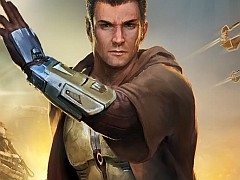Video Gamer is reader-supported. When you buy through links on our site, we may earn an affiliate commission. Prices subject to change. Learn more
The tabloidian drama at the centre of BioWare’s upcoming MMO is whether Star Wars: The Old Republic can finally take the crown from Blizzard. It says something of our industry that BioWare is the one we call David in this Goliath metaphor, when the reality is more like comparing multi-million dollar apples to multi-million dollar oranges. Both are blockbuster MMOs, but even with the kind of filthy lucre being poured into the Old Republic venture, the level of scepticism we’ve seen surrounding SWTOR has cemented its status as some sort of underdog.
While fans saw SWTOR as the first legitimate rival to World of Warcraft, naysayers were busy baptising it as “that single-player MMO” thanks to its focus on pushing single-player narrative as far to the foreground as possible. The result so far is a staunchly BioWare-styled MMO. Picking and playing a class isn’t altogether different to playing through a single-player BioWare title, where quest-givers interact with you via cutscenes and you decide on how to respond through various dialogue options, nudging your morality meter toward either dark or light sides of the spectrum. But whether this narrative-laden system is good enough to create a sea change in the industry is another question.
Here’s the issue:
These design decisions have turned The Old Republic into the first truly character-driven MMO, but this begs the question whether a single-character storyline works for a genre built around massively multiplayer interaction. Can you have it both ways? Well, the game tries to make its case. Star Wars: The Old Republic gives users storylines whose paths can be determined by the actions of other players.
The Old Republic’s conversation system is based on random rolls, much in the same way that loot is divided between players in a group. As part of the dialogue system players get options to choose good, evil, or neutral lines of response while the game automatically rolls a number between 1 and 100. The roll means nothing to the solo player – their dialogue option of choice will play out in the following cutscene regardless – but in groups, the greatest number dictates what happens next. The game loads the cutscene dialogue chosen by the user who won the roll and grants up to eight “social points” to the winner, used later to buy items.
Unfortunately, in significant missions this gets frustrating. Life-or-death decisions that let you decide the future of an NPC can feel unfairly placed in the hands of a peer when you hit an unlucky roll. While their chosen option won’t have an effect on your character’s morality – if you chose the dark-sided option, that’s what will stick in terms of your avatar’s character development – it will affect the narrative. A dead NPC is a dead NPC, an imprisoned character stays imprisoned, and so on, and it’s all thanks to randomly-generated numbers.
Similarly, at this point in the beta companion affection seems to go completely ignored unless you win the roll. Following in line with past BioWare conventions, The Old Republic features companion characters who will become progressively more or less affectionate toward you depending on your actions, leading up to the inevitable romance plotline. At the moment it’s possible for you to choose a dialogue option that might give you an additional 40 affection points with your companion, and yet if you fail to win the conversation roll the affection goes unaltered, leaving you with a measly +1 social point.
The result right now is an imperfect system that doesn’t necessarily encourage social interactions in standard missions outside of PvP or the game’s Flashpoints – instances, by any other name.
But despite being imperfect, it’s a setup that still works entirely in the game’s favour, and here’s why: Star Wars: The Old Republic is the first MMO to make you care about your avatar as much as your level.
The features taken out of BioWare’s single-player fare – the dialogue trees, morality, and relationship building – provide the answer to the question: how the hell do we make an MMO about more than just XP? Purists might wonder whether it’s even necessary to do this, but BioWare is trying for something legitimately new: Where WoW hands you an empty vessel to level up, SWTOR gives you the equivalent of a Shepard to customise, an avatar whose interactions with NPCs during missions function as a way of developing the character, not just a conduit for XP.
Where taking quests in World of Warcraft is what you do to ‘get to the fun’, in Star Wars: The Old Republic it’s part of playing as much as combat is, and similarly dialogue selection is as important to character development as loot is to better armour. This is where The Old Republic makes its mark: not by dramatically dethroning WoW, but by creating the best takes on character customisation – stretching all the way down to the customisation of personality – of any game from the genre.
The Old Republic storytelling antics alone are still too green to dethrone WoW, but they may help to make it the best MMO since.

/https://oimg.videogamer.com/images/db2e/star_wars_the_old_republic_64.jpg)